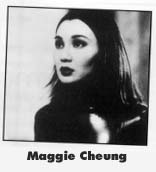Irma Vep
Nobody listens to her. She's a Chinese actress, and she doesn't know french. She's of no use amidst that group of French cinema people, where she landed almost by accident. She's not really trying to raise her voice, she has no cause to defend, but even when she's being asked something, the Frenchmen make it clear that it doesn't matter. Whatever she says, it's ok.
They just don't pay attention.
But this guy, the director of the crew, the mother of cinema theory, he likes her. He doesn't listen to her any more than the others. But then again, he never listens to anyone. He's the chief. Others are supposed to listen to him. Others have always listened to him. But he can't talk anymore. He feels that his position as high priest of cinema has tricked him. He's full of shit. He knows it, but he won't face it.
The guy is heading straight to a nervous breakdown, jeopardizing the project - a remake of Les Vampire , 1916 (see notes) -, especially the cast of the Chinese actress, which nobody understood. But the guy insisted on having her in the main part. He was struck by the magic of Maggie Cheung's acrobatic stunts in Hong-Kong action movies. He argued that nobody else could play the part. Not after Musidora's performance, the original actress who had mesmerized her audience in the early century.
Nobody listens to her - she's an outsider - but she's clever. Unlike her French peers, she sees through the surface of things and beyond the crust of convention. Every little bit she says, unnoticed among her fellows, is full of blinding simplicity, and honesty. Not only is she clever, but she has grace too. And sensuality. Her silhouette, dignified in black rubber tights, is seen at night haunting on the roofs of Paris, for she is Irma Vep - a sort of female version of Fantomas.
Next to her, the French cinema people look like clowns, humans of a lesser degree. Like this interviewer, stubborn and proud, or the production manager, tight-assed and hysterical. She remains calm and humble at all times, and even feels empathy with the self-centered director.
There is more than a portrait of a Chinese in Paris to Olivier Assayas' film. It's a subtle work, driven by the antagonistic feelings of the director towards the cinema of his country - a denial and an hommage at the same time. Extremely well filmed and acted, Irma Vep is provocative, charming, and not to miss.
Notes: "Les Vampires" is a series of ten episodes made in 1916 by the french director Louis Feuillade. It had Musidora in the main role, a woman who is sometimes considered as the first vamp in the history of cinema. Oddly enough, the series has nothing to do with vampires, but with crooks, who are just calling themselves vampires. Irma Vep is the name of the female character played by Musidora. It is an anagram of "vampire".
"Les Vampires" is playful and irreverential. It shows an underworld populated by crooks and easy women, conspiring all kinds of scams in a world full of brass and decadence. Irma Vep is a powerful character, and her appearance in black tights, like some sort of a catwoman, with nothing under (a certain degree of transparency in the cloth doesn't leave room for doubts), must have left a powerful imprint on the audience of the time.
Olivier Assayas
Olivier Assayas was a critic at "Les Cahiers du Cinéma", a magazine considered to have inspired the best of french movies, as well as the worst. Started in the sixties, "Les Cahiers du Cinéma", promoted the idea that movie directors are not mere leaders or coordinators of a cinema crew. Instead, they are authors, encouraged to develop an experimental language proper to their medium. In the early days of "Les Cahiers du Cinéma", these views were often demonstrated by the critics themselves, who would readily swap typemachines with cameras. This has ensued in the nouvelle vague, a movement whose most famous representants are Truffaut and Godard.
But, after the peaks of the nouvelle vague came tons of boring movies by directors who took themselves a tad too seriously. Hence, the notorious irritation and impatience of the public towards french movies.
Jean-Pierre Léaud
Jean-Pierre Léaud plays the part of the self-infatuated director on the verge of collapse. He was the favorite actor of Truffaut, and would play only in his movies. He begun his carreer as a boy in "Les 400 coups", and also played in "La Nuit Américaine", another film on a film.
© Daniel Szmulewicz, 1996 - 2011
